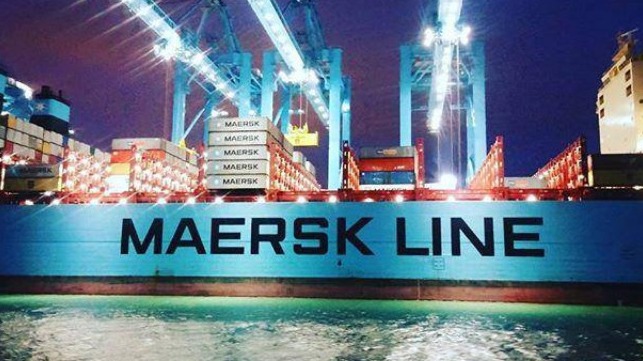Maersk Accelerates Methanol with a $1.4 Billion New Ship Order

Six months after A.P. Moller – Maersk announced that it was pursuing methanol in its plans to decarbonize its containership operations, the shipping giant is accelerating its efforts ordering the first large methanol-powered boxships. The carrier said it represents the next step in the evolution of shipping, however as part of a fleet renewal program versus an increase in capacity.
Maersk confirmed the long-rumored order for new boxships saying that it will build eight large ocean-going container vessels capable of being operated on carbon-neutral methanol. The vessels, which each will have a capacity of 16,000 TEU, will be built by Hyundai Heavy Industries. Hyundai reported the value of the order at $1.4 billion with delivery of the vessels between the first and fourth quarter of 2024. The agreement with HHI includes an option for four additional vessels for delivery in 2025.
“The time to act is now, if we are to solve shipping’s climate challenge,” said Soren Skou, CEO, A.P. Moller - Maersk. “This order proves that carbon-neutral solutions are available today across container vessel segments and that Maersk stands committed to the growing number of our customers who look to decarbonize their supply chains. Further, this is a firm signal to fuel producers that sizable market demand for the green fuels of the future is emerging at speed,”
Maersk said that the vessels will be designed to have a flexible operational profile, enabling them to be deployed across multiple routes and add flexibility to meet customer needs. They will feature a methanol propulsion configuration developed in collaboration with makers including MAN ES, Hyundai (Himsen), and Alfa Laval, using a dual-fuel approach.
The move to 16,000 TEU vessels Maersk said represents the rapid advancement in methanol technology. In July, Maersk ordered its first methanol-powered vessel which is a feeder with a capacity of 2,100 TEU, which at the time they said was the size limit for methanol-fueled propulsion. The vessel is due to enter service in 2023 operating in the Baltic region for a Maersk subsidiary. The newly ordered vessels will be classed by the American Bureau of Shipping and sail under the Danish flag.
Maersk said another challenge will be sourcing adequate amounts of methanol for the vessels. The shipping line is encouraging fuel providers and manufacturers to scale up the production of methanol. Maersk also recently announced an agreement that will provide e-methanol for the feeder vessel.
With the order, Skou emphasized that Maersk remains focused on maintaining a fleet capacity in the 4.0 to 4.3 million TEU range. The new vessels will be fleet replacements for older diesel vessels nearing the end of their life cycle as opposed to capacity expansion. The plan calls for replacing 150,000 TEU of capacity with the new vessels.
The cost of building the new dual-fuel methanol containerships is estimated to be 10 to 15 percent higher, but Maersk reports that shippers are welcoming the news of a carbon-free shipping alternative.

that matters most
Get the latest maritime news delivered to your inbox daily.
“We are very excited about this addition to our fleet, which will offer our customers unique access to carbon-neutral transport on the high seas while balancing their needs for competitive slot costs and flexible operations. To us, this is the ideal large vessel type to enable sustainable, global trade on the high seas in the coming decades, and from our dialogue with potential suppliers, we are confident we will manage to source the carbon-neutral methanol needed,” said Henriette Hallberg Thygesen, CEO, Fleet & Strategic Brands, A.P. Moller - Maersk.
Maersk notes that more than half of its 200 largest customers have set or are setting zero carbon targets for their supply chains. Shippers including Amazon, Disney, H&M Group, HP, Levi Strauss & Co., Microsoft, Novo Nordisk, The Procter and Gamble Company, PUMA, Schneider Electric, Signify, Syngenta and Unilever have committed to actively use and scale zero-carbon solutions for their ocean transport.
